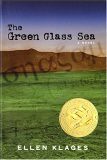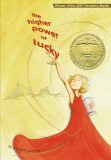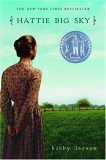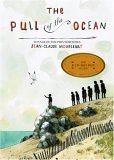Now Reading: Un Lun Dun
Just Finished: The Invention of Hugo Cabret, Diary of a Wimpy Kid, Persepolis: The Story of a Childhood, Special Topics in Calamity Physics, The Brothers Grimm: Two Lives, One Legacy, The Talented Clementine,Persepolis 2: The Story of a Return
The Green Glass Sea by Ellen Klages was this year's winner for the Scott O'Dell prize for historical fiction.
Dewey is a weird kid-- there's something wrong with her leg that makes her limp and she spends all of her time making gadgets and fiddling with stuff. Her dad is working on some top secret project that is going to help win the war and when her grandmother dies, she goes off to live with him.
Dewey didn't realize how top secret this project was. She didn't realize she was moving to a place that didn't officially exist... All she knew was everyone was living out in the desert working on the gadget. The gadget would win the war. The gadget would make everything better.
Suze has been living at Los Alamos for awhile when Dewey moves there-- Suze is a bit awkward and bossy and both of her parents are working on the project-- her mom's a real scientist, not just a typist or secretary like the other moms. When Dewey's dad has to go to Washington for awhile, Dewey moves in and the pair form an unlikely, but entirely realistic, friendship.
What's great about this book is the portrait of day-to-day life at Los Alamos-- you never think about kids living with their families, going to school, and being kids. You never think about the divisions between scientist kids and military kids. And you never think about Los Alamos just plain not existing... (well, at least I never thought about those things.)
This balances the line perfectly of being meticulously researched and historically wonderful, while not letting this detail overshadow the actual story. I liked how realistic the interactions between the kids were-- this unlikely friendship took a long time to develop and it never came across as hokey or simplisitic.
My favorite part of the book was how delicately it dealt with some very large issues that need to be tackled when dealing this topic-- it put them in there so you knew people were worrying about them, but Dewey hears about them and deals with them in a way that is very true to her age. In Surely You're Joking, Mr. Feynman! (Adventures of a Curious Character) Feynman (a minor character in this book, much to my delight) talks about the horror of what they had done after the first test. The book captures this horror well with the adults and the confusion of the kids at what's going on.
Something happens about 3/4 of the way through the book that is a bit of a spoiler so I'm not going to talk about it too much, but it was just too much and I don't really think it was necessary (but it might be for the sequel that I am very much looking forward to!)
The other thing is... I'm assuming that if you're reading my blog, you know what the gadget was-- you know what was invented at Los Alamos during WWII to win the war. Dewey and Suze, and therefore the reader, never find out was the gadget was, and I'm not sure how much sense the ending of the book is going to make if you don't know. I also don't know if the intended audience is going to automatically know what the gadget was...
Still, an excellent book and a well-deserving win.
Once upon a time, a very long time ago, I promised I'd review this years Newberry winner, The Higher Power of Luckyby Susan Patron.
I wanted to wait down until all the fervor over SCROTUM faded away. And then it came back. And then it faded again.
Anyway... Lucky really surprised me. I hadn't heard anything about it before Newberry day and in reading the description-- it didn't sound kid-friendly. It sounded like it was going to be really nostalgic and an adult book written for kids.
It wasn't! I was so happy!
Lucky lives with her French guardian (he absent father's ex-wife) in the middle of the desert. She likes to eavesdrop on 12 step meetings to find out how people find their higher power-- higher power sounds like a handy thing to have, but Lucky's hoping to avoid hitting rock bottom in order to get it. Hitting rock bottom doesn't sound like much fun.
At the same time, Lucky's worried her guardian is going to go back to France-- she seems homesick and her passport was out the other day.
Deep down, this is a really sweet tale that will appeal to younger readers, but also has some really big issues for older readers to get into.
Most enjoyable was the large cast of wacky, but believable, characters. A good book and my favorite Newberry winner of the last few years.
Hattie Big Sky by Kirby Lawson was a Newberry Honor book that is being found in the YA section at all the libraries I've visited!
Hattie is an orphan who inherits a homesteading claim in Montana. In order to keep the claim, she has to cultivate a large portion of it (which involves clearing it first!) and fence off most of it. By hand. By herself. She knows nothing about farming. Or cooking. Or anything. She wants to keep the claim, but she'll be lucky if she even survives.
Her next door neighbors are helpful and nice and the first friends Hattie makes, but one of them is German, and it's smack in the middle of WWI. Montana is rife with anti-German sentiment, loyalty leagues and other things making things hard for Hattie's friends. How can she reconcile her soldier-friends killing Germans across the ocean with her German neighbor fencing her claim in the middle of the night?
Tragedy and hope about in another great example of what historical fiction should be in this book that's perfect for Tweens and those right on the kidlit/YA break.
My favorite part was the ending and how it was handled. The author's note at the end is great, as are the recipes!
The Pull of the Ocean by Jean-Claude Mourlevat won the Batchelder award for translated work this fall.
The Doutreleau children are all sets of twins, except for the Yann, the seventh and the last. Yann is small and mute, but notices everything and communicates with his older brothers silently. One night he wakes up to his parents fighting and lets his brothers know they have to leave, to escape. For days they walk, following Yann's inner compass to the ocean.
This is more than just a retelling of the Tom Thumb. This story is told in brief accounts of people who saw the children and interacted with them only briefly-- sometimes only seconds, never more than an hour or so. Interspersed are the accounts of the children, but never Yann.
This book is surprisingly powerful and moving without ever being overwrought, over-contrived, or melodramatic. I couldn't put it down and it haunts you long after you turn the final page-- I highly recommend!





No comments:
Post a Comment